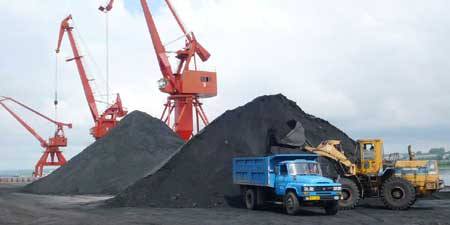Energy
Coal consumption to fall
By Liu Yiyu (China Daily)
Updated: 2010-09-16 09:48
 |
Large Medium Small |
 |
|
Coal from Russia is unloaded in Heihe, Heilongjiang province. Analysts said China's efforts to cut emissions will lead to less coal consumption. Qiu Qilong / for China Daily |
Coal prices at Qinhuangdao port, a domestic benchmark, shed 5 yuan ($74 cents) per ton this week, following downward momentum in recent weeks, while stockpiles rose 6.18 percent to 7.73 million tons.
China's coal consumption will decline by 132 million tons this year from 2009 due to the nation's efforts to raise energy efficiency by 4 percent in 2010, according to a research note by Cinda Securities.
Falling coal consumption is also part and parcel of the government's effort to limit gross domestic product (GDP) growth to 9 percent this year to prevent the economy from overheating. GDP growth in the first half of this year reached 11.1 percent.
"The country's desire to reach its energy-saving target has had an impact on the coal industry and we expect the coal price will decline by 10 percent," said Song Zhichen, an industry analyst at China Investment Consulting.
The Ministry of Industry and Information Technology last month ordered over 2,000 companies in 18 industries, including cement, steel and coking, to shut outdated manufacturing facilities by the end of September.
Local governments therefore are in a rush to meet the deadline, forcing energy-intensive factories to close.
Industrial electricity accounts for more than 70 percent of the country's total power consumption, with steel and cement makers being among the top power consumers.
"As China scales back its demand for coal, it will import less from other countries," Song said.
The nation's imports of coking coal declined in the three months to July, and fell 17 percent in that month compared to June.
Cinda Securities estimates that coking coal consumption will decline 6.7 million tons this year due to the country's urgent need to close outmoded steelmaking facilities and increase energy efficiency.
"Closures in the steel industry will hit coking coal consumption as this is an essential material for steel production," according to Song.
That could result in tough times for the coking coal business in China which is already facing a supply glut, analysts said.




